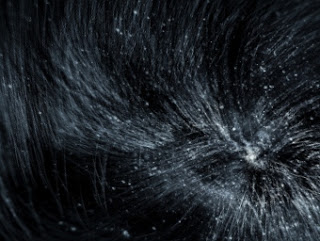Navigation
Hair Loss News Archives
May 2013
Fighting dandruff head on
Are those white, itchy flakes of skin stopping you from wearing your favourite black top?
It could be dandruff and though it’s not a serious condition, we know it can be embarrassing. And yes, dandruff is a chronic condition, but it is quite harmless.

Dandruff occurs when your scalp is either oily or very dry and characterized by itching, producing white flakes on your scalp.
This is one condition which is found in people of all ages.
There are three types of dandruff which might attack your scalp for different reasons.
And each of these conditions has to be treated differently.
Fungal dandruff
There are times you may mistake dandruff for dry scalp and shampoo less frequently. However, what is shocking is that this just worsens the condition.
There is a fungus called malassezia which lives in our scalp and the most common cause of dandruff is the overgrowth of this fungus.
So, when you stop washing your hair as frequently as you should, your hair becomes greasy, the fungus feeds on this and dandruff grows.
Seborrhoeic Dermatitis
Seborrhoeic Dermatitis is a more severe form of dandruff which causes greasy bran-like scales. This type of dandruff is almost always accompanied by skin inflammation that will affect your forehead, eyebrows, the lines of your cheeks, the skin around your nose and even your armpits.
The good news for those of you suffering from seborrhoeic dermatitis is that direct sunlight improves this condition and relieves its symptoms.
Scalp Psoriasis
Another common skin disorder that produces raised, thick, silvery scaly patches on the scalp is called the Scalp Psoriasis. It sometimes even spreads beyond the scalp to your forehead, behind the ears and back of the neck.
Though very similar to dandruff, scalp psoriasis is much harder to treat.
This condition is not contagious. However, experts opine that scalp psoriasis could be a result of an abnormality of the immune system which makes the skin cell to grow very quickly, resulting in building up of patches.
If scalp psoriasis runs in your family, you are more likely to be affected by it.
Causes
Though the exact cause for dandruff-triggering conditions is not known, extremely oily scalp, hormonal imbalances, extreme stress, heart problems are often said to be the causes. In some cases, even the chemicals used in the hair care treatment is said to trigger dandruff.
Difference between seborrheic dermatitis and psoriasis
Since both scalp psoriasis and seborrheic dermatitis are common conditions that affect the scalp, it can sometimes be difficult to differentiate between the two. In addition, even some of the signs and symptoms such are itchy, scaly scalp are same.
However, here are few differences which your doctor might be able to tell: scales of scalp psoriasis are thicker and drier in appearance when compared to the scales of seborrheic dermatitis.
Scalp psoriasis affects not just your scalp but other areas of your body like elbows, knees, hands, feet or even your nails.
Signs and symptoms of Scalp Psoriasis
Your skin will have red patches with silvery white scales
These silvery white scales may be attached to your hair shaft
The patches or the thick crust on the scalp will bleed when you try removing them
These red patches might extend beyond your hairline
You will notice itching and soreness
Prevention of Scalp Psoriasis
Though complete cure of scalp psoriasis is not possible, you can take a few steps to ensure that the condition does not worsen.
Wash your hair daily
Avoid sunburn as psoriasis may develop on the injured skin.
Comb and brush your hair regularly. This can help prevent psoriasis on the scalp.
However, make sure you don’t brush too hard as scratching can cause irritation.
Signs and symptoms of Seborrheic dermatitis
You will notice red, oily skin covered with greasy white or yellow scales
In this case, the patches or the thick crust can be removed easily and there will be no bleeding
These patches are usually confined to the hairline
In Seborrhoeic dermatitis, itching might be severe
Prevention of Seborrhoeic Dermatitis
While it might be difficult to completely get rid of dandruff, you can definitely contain it.
Shampoo your hair regularly
Learn to manage stress as stress can trigger dandruff or exacerbate existing symptoms
Stay away from hair sprays and styling agents as they make your scalp oily leading to dandruff.
